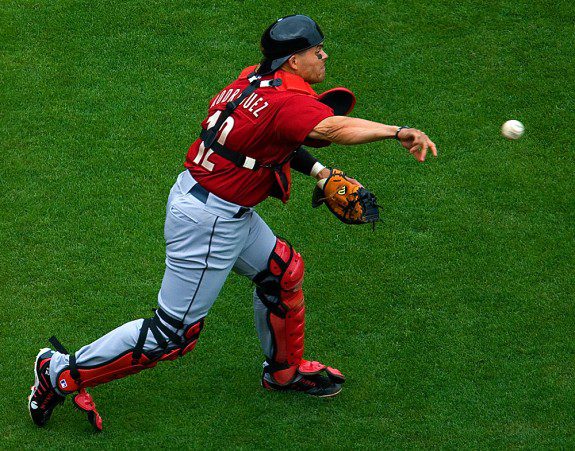

The recent announcement that Ivan (Pudge) Rodriguez would be retiring is sad day for many baseball fans. Especially those who grew up in the same time period I did and witnessed one of the greatest catchers ever to play the game in his prime.
For me as a defensive guy, I didn’t care he hit .296 in his career. The thrill of watching Pudge play was when some runner was dumb enough to think he could steal on a cannon. The quick release and accuracy with which he threw the ball may never be seen again.
He won 10 consecutive Gold Glove awards (from 1992 to 2001) with the Texas Rangers. He went on to win three more with the Detroit Tigers. But those awards often are handed out to recognizable players who have a history of being good defenders. They aren’t always a true indication of how talented a defender really is.
Pudge was an exception to that statement. He truly was the greatest defensive catcher of his time, leading the league in caught stealing percentage nine times. In his 21-year career, he threw out 46 percent of base stealers and 661 total. That puts him 39th on the all-time list, but that doesn’t rightly show his place in history because many base runners quit trying to run on him early in his career.
Just the mere presence of Pudge behind the plate could shut down the most prolific speed teams of the 1990s. Runners had to be aware with him behind the plate, knowing his arm was strong enough to pick them off if they wandered too far from the bag. The fact many teams refused to run on him saved his teams hundreds of runs in the course of his career.
The closest example we have to Pudge today is Yadier Molina. As was evident in the 2011 playoffs, teams are reluctant to send a base runner with Molina behind the plate. That helps slow down speed and can take a team out of its game plan. Molina has won the Gold Glove award the past nine years in the National League, and it’s basically a foregone conclusion he’ll continue to win it each and every year. And he’s thrown out only 164 in his nine seasons.
In 1992, Pudge cut down 57 runners attempting to steal. That was his second year in the big leagues and really his first full year as an everyday catcher. The next season, he threw out 51, and then he was quickly labeled as a catcher with a great arm. That set him up for an established career in which he was voted to the All-Star Game 13 times, won an MVP, seven Silver Slugger awards, had 2,884 hits, 311 home runs, knocked in 1,333 and scored 1,354.
Those offensive numbers are nothing in comparison to what he did behind the plate as a catcher. The role of a catcher also should include how to manage the game effectively for the pitcher and to stop teams from stealing bases and scoring runs. For that, Pudge could be ranked as the greatest we’ve ever seen. He’s no doubt a first-ballot Hall of Famer and a player fans truly will miss.





